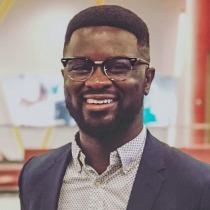
Eugene Mangortey
What is your next adventure?
I will be going to the Federal Aviation Administration's Technical Center in New Jersey where I'll be working with big data, machine learning, and analytics. One thing the FAA is trying to do is to improve the way it deals with a lot of data that is coming into them in different formats on a daily basis. We need to bring it all into one area to extract, process, and analyze. Our team will put it all on one platform and we'll devise tools to analyze it, real-time.
What about your next adventure are you most looking forward to?
I've always been excited to learn new things. This will give me that opportunity. I'll learn how to use new technology and software and I'll be learning more about the FAA's systems. What I really like about this is that I will directly see the impact that my work has on the aviation industry. My contribution won't be some small task that languishes on some forgotten computer. The fact that I have an aerospace background and a computer background is even better. The aerospace industry needs to incorporate more big data, analytics, and machine learning into what they do. I have the ability to make that happen because I can see both sides - the front-end and the back end.
Did you have any previous co-op, internship, or research experience in this area?
Over the past year I've worked a the FAA's Technical Center while I've been working on my dissertation. Prior to that, I did a summer internship at the same location. This has been fantastic because when I had a question that related to my thesis, the only thing I had to do was to walk down the hall and ask one of my work colleagues. I have Dr. [Dimitri] Mavris to thank for that. Another advisor might have said I had to be on campus to complete my doctoral thesis, but he just said "If you think it will push you forward, do it." And that's what I did. My dissertation looked at the application of machine learning and big data to the areas of airport operations and flight safety.
How did your educational experience at Georgia Tech help you to achieve your goals?
The research opportunities are amazing. In my case, I started grad school not knowing exactly what I wanted to do, but the research I was able to do, and the people who mentored me along the way, they made all the difference. Olivia Pinon Fischer has been my mentor from the very first day I joined ASDL. She's encouraged me, with fantastic research projects - work that sharpened my critical thinking and comprehension of the material. She pushed me to publish my work, and she encouraged me to do something a lot of masters students don't do -- a master's thesis - which made my Ph,D. thesis a whole lot easier to complete. I owe her a lot.
The 19-year-old Eugene who came to Tech as an undergrad was fascinated by planes. As a child I lived next to an airport in Ghana, and I grew up crazy about them. I even knew their schedules. The Eugene who just earned his doctorate likes to solve real world problems, and that's what I'm going to be able to do at the FAA.
What advice would you give to an underclassman who would like to follow the same path?
For undergrads, I'd say don't be afraid to jump into undergrad research. I discovered ASDL as an undergrad, and that's how I got interested in undergraduate research. If I hadn't done that, i don't know what I would have done.
Secondly, I did two semesters abroad - at Georgia Tech Lorraine - and that's actually where I made my closest friends.
Also, be open-minded about exploring other research areas and go out of your way to explore those new areas when you identify them. For me, I was open-minded because, honestly, I didn't know where I wanted to focus. And it meant that I did some research on the side, just because I was interested.